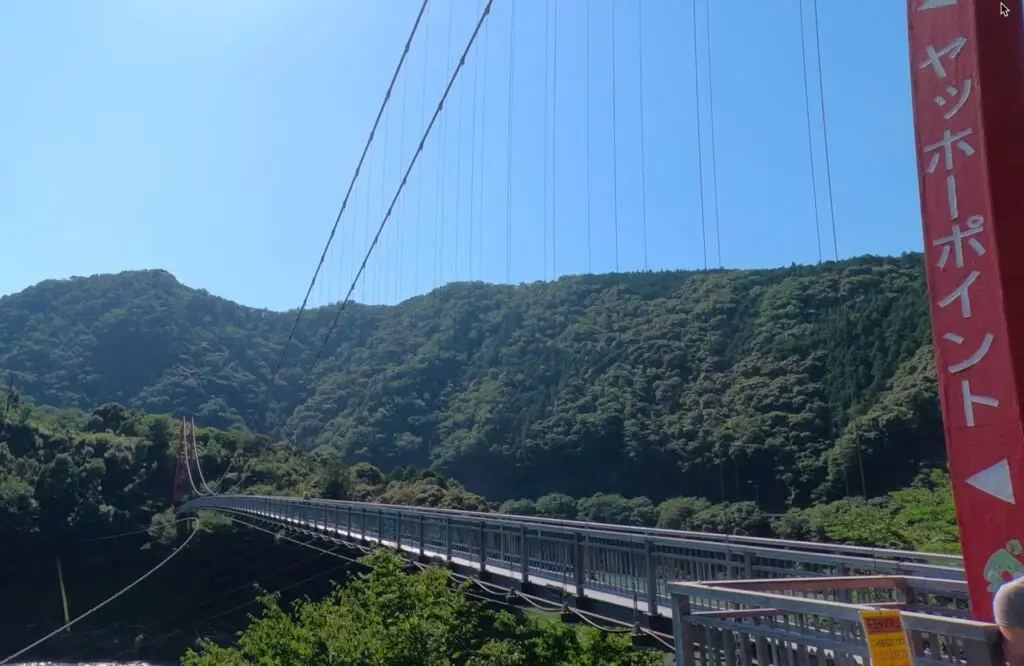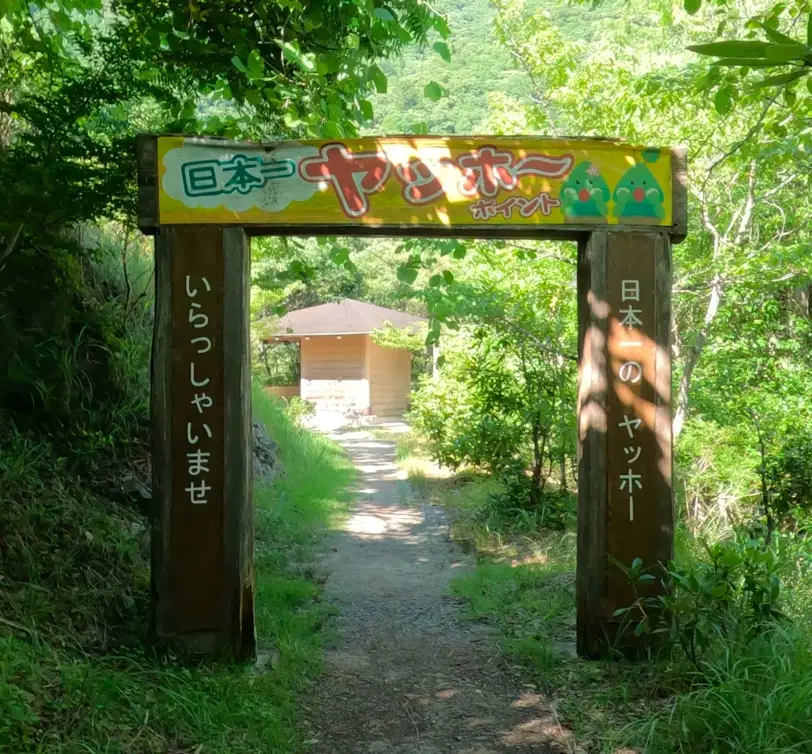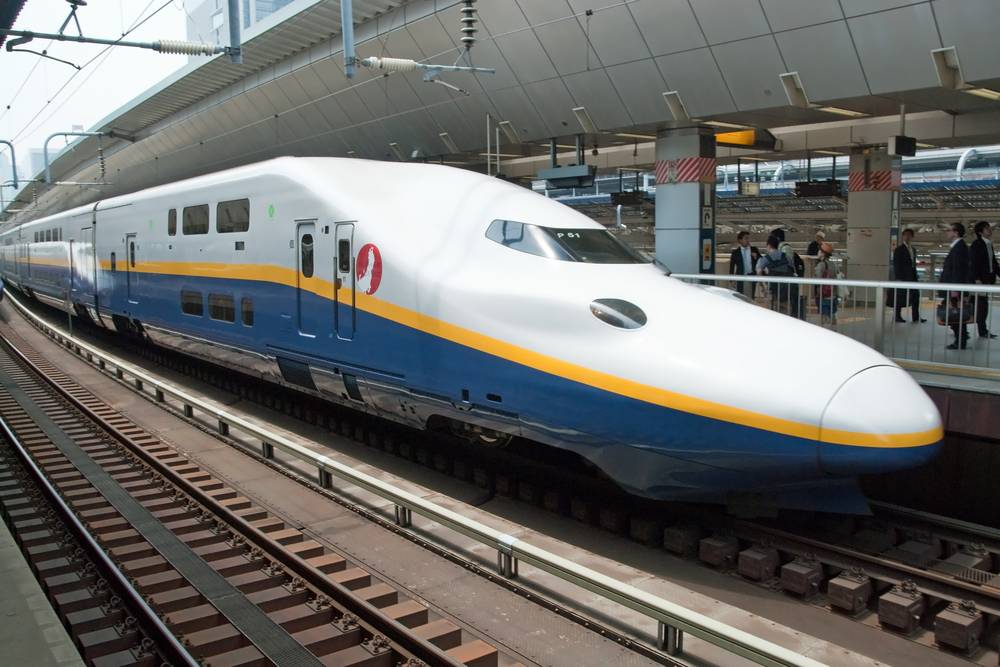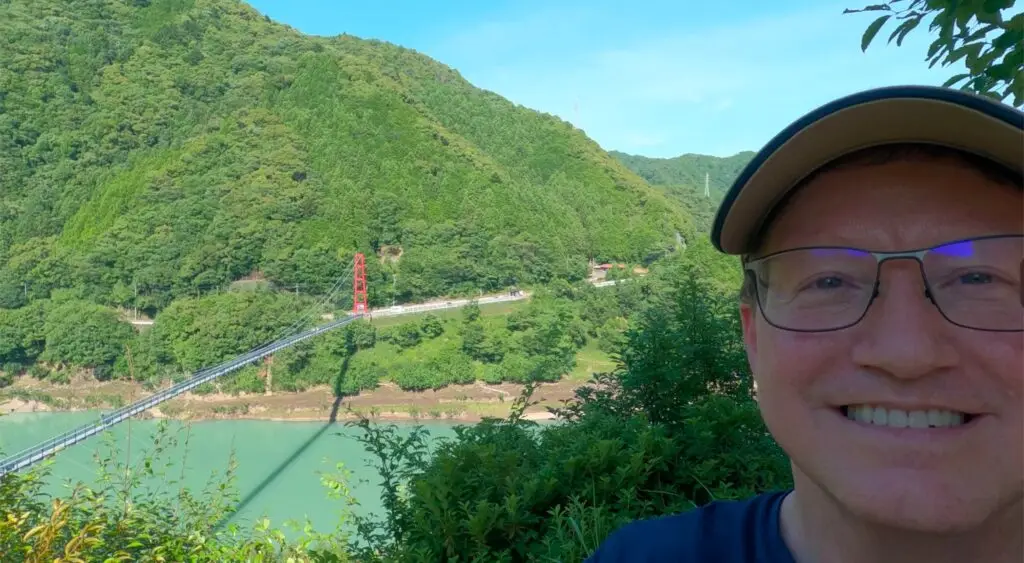I never expected our drive would lead me to a place quite like this. Japan, with its endless capacity for unexpected surprises and delights, truly knows how to keep you guessing!
The winding mountain roads carried us deeper inland, into the heart of Wakayama. The views of the lush green mountains were gorgeous. Every turn made me wish for a pullout to capture the scenery, but photo stops were rare on this particular route.
Eventually, we emerged into a clearing, and there it was: the river snaking through the valley below, cradled by mountains on all sides. And stretching majestically across it, connecting two distant mountain faces, was a long, slender suspension bridge. Our path, it seemed, lay directly across that swaying span.

After parking, we ventured onto the bridge, pausing to admire the mesmerizing view of the river far below. We even spotted tiny tents and miniature campers dotting the riverside, making the people look so small from our dizzying height.
Once safely across, our journey continued up a winding trail, complete with charmingly makeshift stone stairs, leading us higher and higher.
And “FOR WHAT?” you might just be asking yourself right now.

It’s certainly not every day you witness a reserved Japanese person shouting “Yaa-hooo!” at the top of their lungs. But that is precisely what this place, known as “Ya-hoo Point,” is famous for. We had arrived at the perfect spot, where a hearty “Ya-hoo!” could reverberate and echo across the entire valley.
Our friend, Hiroko, enthusiastically invited me to go first, to shout “Ya-hoo!” with all my gusto and hear my voice echo. And, well, let’s just say my attempt was by far the most hilariously underwhelming of the bunch!
Who knew a spontaneous shout into a valley could be so memorable? It was an unexpected, joyful, and completely FREE experience. And that word, ‘free,’ got me thinking… While Japan offers countless moments that cost nothing but your adventurous spirit, there are a few important updates regarding your travel budget for 2025 (and beyond!) that I want to share. Let’s make sure your yen goes as far as possible.
The Hidden Costs Nobody Warns You About
First, there are some new rules related to dynamic pricing and extra fees. My summer itinerary already has the Osaka World Expo 2025 circled in red. I’ve been dreaming of this for ages, and it’s going to be an absolute highlight! But I’ve also learned that popular spots like Expo 2025, Disney, Universal Studios Japan, and many other attractions in Tokyo and beyond are adopting dynamic pricing. This means ticket costs can fluctuate based on the day and expected crowds. So, what’s my strategy for tackling this?
My plan is simple: I’ll be diligently checking their websites for pricing patterns, aiming to snag my tickets for a weekday, and strategically avoiding those peak hours. Every little bit saved adds up, and I’d much rather spend that extra cash on another delicious bowl of ramen!
And speaking of epic journeys, my ultimate summer challenge is climbing Mount Fuji! I’ve even convinced my two nephews to join me on the summit hike. But here’s an important heads-up: new regulations are now in place for the climbing season (July 1st to late September). Earlier this year, a new fee of 4000 yen (around $27 US) per climber has been implemented for all trails leading to the summit. This fee was introduced to address overcrowding and environmental issues, and there’s also a daily limit of 4000 climbers per trail. So yes, you guessed it, another weekday climb for us!
Why Your Dollar Doesn’t Go As Far (and What to Do About It)
With global economic shifts and talks of international tariffs, the Japanese yen has been quietly strengthening. What does this mean for your travel budget? Simply put, your dollars (or euros, or pounds!) might not stretch quite as far as they used to. Last summer, I was happily exchanging my dollars for 150-155 yen, but now, a single dollar will only fetch around 142 yen. And don’t forget, airport and bank exchanges often tack on extra fees, worsening the deal.
To combat this exchange rate challenge, I have a smart strategy. When I use my credit card, I’ll always choose to pay in Japanese yen (JPY) if given the option, rather than my home currency. This little trick helps me bypass any annoying dynamic conversion fees. And for cash, my go-to is withdrawing from 7-Eleven ATMs using my Charles Schwab debit card. They consistently offer some of the best exchange rates, and Charles Schwab thoughtfully refunds all ATM fees, no matter where I am in the world.
The JR Pass Reality Check Could Save You Money
Finally, let’s cover transportation issues and costs. Japan has a departure tax, sometimes affectionately (or not so affectionately!) called the “Sayonara Tax.” Currently, it’s 1000 yen (under $7 US) and has been added to your departure air or cruise ship ticket since 2019, funding Japan’s tourism infrastructure. However, there are ongoing discussions about significantly increasing this departure tax to 3000-5000 yen. To put that in perspective, Australia’s departure tax is around 7000 yen, and in the US, it’s $22.90, which is just over 3000 yen.
While transportation within Japan remains incredibly efficient, costs have seen a significant jump. For years, the JR Rail Pass was a must-have for savvy travelers, offering unlimited travel on JR trains for a set number of days. However, as of October 2023, the cost of these passes increased dramatically, making them far less economical unless your entire trip revolves around extensive train travel.

For example, the 7-day standard JR Pass used to be around ¥29,000, but now it’s closer to ¥50,000. It’s like your $200 budget item suddenly costs $350. You now need to take roughly 3-4 long-distance shinkansen trips to justify the 7-day pass. If you’re planning just Tokyo-Kyoto-Tokyo travel, individual tickets will save you money.
Oh, and a quick word about taxi cabs. With the recent surge in tourism, we’re seeing increased shortages and longer wait times for taxis, especially in big cities and popular tourist hubs. You might think, ‘Ah, I’ll just use Uber or Lyft for a better price!’ Think again. While rideshare services did become available in April 2024, there’s a unique twist: the government has empowered traditional taxi companies to manage these services and mandated that prices must be equivalent to standard taxi fares. This regulation ensures taxi companies are protected, but it means rideshares aren’t necessarily a cheaper alternative. They’re just another option for finding a ride.
I get it. You’ve likely been saving for this Japan trip for months (maybe years), and it can feel a bit deflating to hear about rising costs. But consider this your insider advantage! Knowing these changes means you can plan like a pro, avoiding credit card regret and ensuring every yen brings maximum joy.
The good news is, Japan still offers incredible value. While some things have shifted, it remains more economical than many famous US cities. The country continues to surprise and delight with its affordable, delicious meals, serene (and free!) temple visits, breathtaking hiking trails, and of course, those unique, priceless moments like discovering Ya-hoo Point, where the best experiences require only courage and a willingness to shout!
My goal is to arm you with the latest insights, so your adventures are as smooth and joyful as possible. So, while that Ya-hoo Point was a delightfully free surprise, preparing with this information ensures your Japan journey is filled with the right kind of surprises and leaves you with incredible memories.
Do these changes impact your Japan travel plans? Have you already encountered any of them?

Whether you’re shouting across a valley or navigating fluctuating exchange rates, may your Japan adventures be full of good surprises. And when the moment comes, don’t forget to let out your own echo across the mountains: “Ya-hoo!”